Dr. Parker [HHMI Fellow] studies the role of molecular assemblies known as stress granules that form when cells are exposed to stressful conditions. The assembly of stress granules upon cellular insult is thought to regulate gene expression and modulate cell survival. Notably, stress granules are present in various cancers and many chemotherapeutic treatments lead to the formation of stress granules. Dr. Parker aims to determine the mechanisms regulating stress granule assembly and disassembly to understand how stress granule formation supports the development of cancer and chemotherapy-resistant tumors. This research has the potential to discover novel targets to treat cancers as well as sensitize chemotherapy-resistant cancers to existing treatments. Dr. Parker received his PhD from Colorado State University and his BS from the University of Oregon.
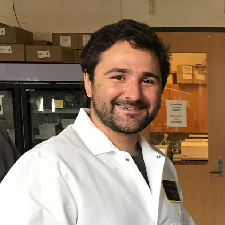
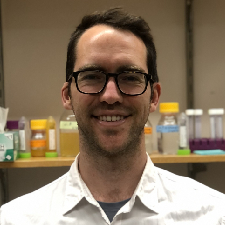
One of the defining features of cancerous cells is that they divide quickly. The composition of the human microbiome is also due to differences in how quickly microbes grow. How do we determine how fast cells are growing in their natural environment? Is there a way to take a ‘snapshot’ and turn it into a ‘growth rate’? This is the fundamental problem Dr. McCain is studying. He is using computational simulations, machine learning, and experiments with bacteria to determine the optimal way to use markers of gene expression to estimate these critical rates. This project will provide fundamental insights into the use of gene expression data to key processes like growth rate or metabolite secretion rate, both of which have implications for cancer biology. Dr. McCain received his MSc and PhD from Dalhousie University and his BSc from the University of Western Ontario.
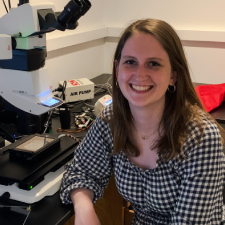
Dr. Johnson [HHMI Fellow] studies the role that a particular type of cell-cell communication, known as quorum sensing, plays in the development of spatially structured bacterial communities called biofilms. Biofilm formation promotes disease in many clinically relevant bacterial species, and infections caused by them pose severe risks for patients receiving chemotherapy. Dr. Johnson is currently investigating how quorum sensing within biofilms establishes patterns of gene expression, and in turn, how these patterns drive biofilm development and dictate biofilm architectural features. By defining mechanisms underlying biofilm formation and biofilm architecture, Dr. Johnson hopes to contribute to the generation of new approaches for disrupting quorum-sensing-controlled bacterial community interactions as a means of combating bacterial pathogens. Dr. Johnson received her PhD from MIT and her BS from Yale University.
Cancer cells rely on efficient uptake, conversion, and exchange of nutrients and vitamins to support their rapid growth and survival. The molecular transport channels that allow passage of nutrients between the different cellular compartments are critical for the survival of cancer cells and are thus promising as potential drug targets. However, drug discovery efforts are hampered by a lack of basic understanding of these channels' identities, functions, and regulation inside cancer cells. Dr. Kory's research aims to identify transporters central to cancer cell nutrient supply and detoxification pathways and determine their role in the emergence, survival, and aggressiveness of cancer. Her research is relevant to all cancers, but particularly pediatric, blood, and breast cancers.
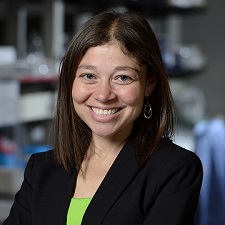
Groundbreaking advances in immunotherapy have revolutionized the treatment of cancer. In particular, new antibody drugs that block immunosuppressive pathways have achieved remarkable success in reawakening the immune system to clear tumor cells, leading to lasting cures in patients whose cancers do not respond to any other therapies. Unfortunately, the majority of patients (>70%) do not respond to immunotherapy treatment. It is difficult to predict which patients will benefit, creating an urgent demand for novel immunotherapy drugs that act through alternative mechanisms. Dr. Spangler is working to develop a class of antibody therapeutics that target cancer-promoting pathways in a different way than all current immunotherapies, with the goal of drastically expanding the percentage of cancer patients who benefit from them.
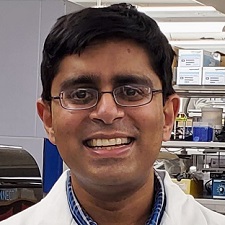
Epidemiologic studies have revealed that many cancer types display differences in incidence or outcomes between the sexes. In most cases, these differences are only partially explained by non-genetic factors such as hormonal differences, carcinogen exposure, lifestyle, and access to health care. Our understanding of how genetic factors contribute to differences in cancer incidence between the sexes remains incomplete. A fundamental genetic difference between the sexes is in chromosome composition. Relative to male somatic cells, female somatic cells have an extra X chromosome. Most genes on the second copy of chromosome X in females are inactivated via a process known as X-chromosome inactivation, which approximately equalizes the dosage of X-linked genes between males and females. Dr. Viswanathan's project tests the hypothesis that genetic alterations to the X chromosome in cancer may perturb this carefully regulated process and thereby contribute to differences in cancer incidence or pathogenic mechanisms between males and females.
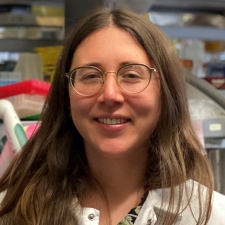
When an organism is developing, it must correct mistakes that might occur at the level of individual cells or tissues. Dr. Triandafillou [National Mah Jongg League Fellow] wants to better understand how error correction systems work, and why they might not work in cases like cancer. To explore these developmental questions, Dr. Triandafillou uses what are called gastruloids, 3D clusters of stem cells that can organize themselves and transform into the basic building blocks of an organism. She developed a method using microscopy to trace the history of these cells and measure how much their past state and history influence what they become. Dr. Triandafillou wants to see how differences in individual cells might impact what those cells eventually turn into, and how such differences affect the correction of mistakes like abnormal growth, bias in cell types, or missing cell types. She is also interested in how the cells around an error react to it. Dr. Triandafillou received her PhD from the University of Chicago and her BS from Temple University.
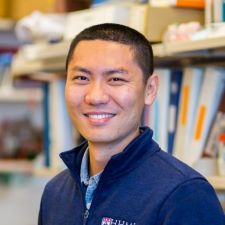
On the cellular level, aging manifests as cellular senescence—when cells permanently stop multiplying but do not die. Aberrant accumulation of senescent cells is thought to be a major contributor to age-dependent tissue degeneration and its associated pathologies. Elimination of senescent cells has been shown to improve age-associated tissue damage pathologies and extend healthy lifespan in mice. Senescent cells undergo extensive remodeling on their surface, including increased production of many surface proteins. Dr. Zhang [HHMI Fellow] is using a quantitative proteomics approach to investigate the mechanisms and biological consequences of cell surface remodeling in senescent cells. His goal is to identify new therapeutic targets on the senescent cell surface and develop next-generation chimeric antigen receptor (CAR) T cells and antibodies to evaluate their impact on age-related diseases. Success with this approach may have a transformative impact on treating life-threatening diseases like cancer, fibrosis, and atherosclerosis. Dr. Zhang received his PhD from Gerstner Sloan Kettering Graduate School and his BS from Sun Yat-Sen University.

Dr. Woida studies the foodborne pathogens Listeria monocytogenes and Shigella flexneri that enter and replicate within human cells. These bacteria also directly infect neighboring cells by pushing against the host cell membrane to form long membrane protrusions that extend and eventually release the bacteria into the new cell. This process of cell-to-cell spread requires the bacteria to hijack intercellular signaling pathways to reshape the host cell membrane. These signaling pathways normally regulate human cell adhesion and motility, and their dysregulation promotes tumor growth and metastasis. Dr. Woida’s goal is to uncover the unique mechanisms by which these pathogens remodel the host cell membrane to gain insight into how the co-opted intercellular signaling pathways function under both healthy conditions and tumor progression. Dr. Woida received his PhD from Northwestern University and his BS from the University of Illinois at Urbana-Champaign.
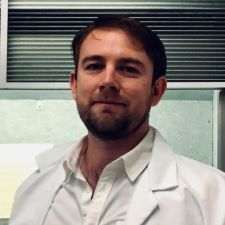
Cells are compartmentalized into membrane-bound and membrane-less organelles, providing spatial structure to the cell’s concentration of proteins and nucleic acids. Dr. Kilgore’s research aims to understand the environment inside different organelles and apply this knowledge to the development of targeted cancer therapies, as better targeting within the cell will improve drug efficacy, increase potency, and decrease side effects. Using both live cells and reductionist models, he will investigate how molecules distribute themselves within the cell as a function of their chemical properties. Learning and applying the chemical grammar of this spatial partitioning will enable the design and preparation of molecular probes and drugs that synergize with the chemistry of the cell as a mechanism of treating all cancers. Dr. Kilgore received his PhD from Massachusetts Institute of Technology and his BS from the University of California, Berkeley.
